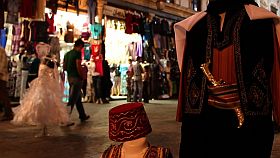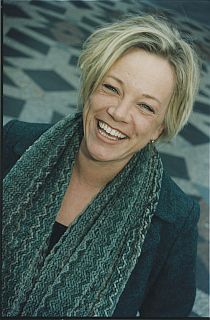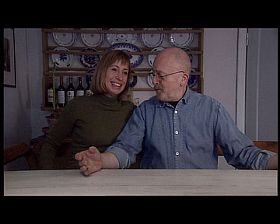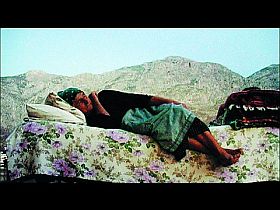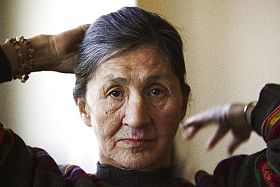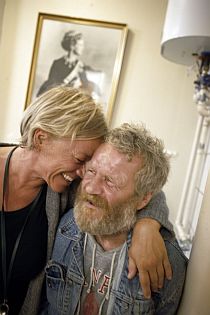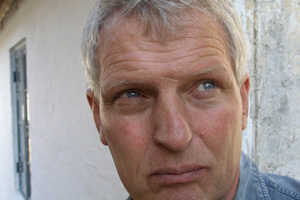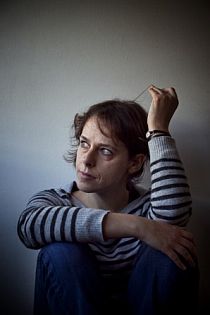Always with a camera at hand, be it to catch a moment in life…
THE JEWISH STREET (1992)
by Allan Berg Nielsen
The camera from high above shows me Riga. The city set in its landscape. I’m drawn closer, zooming in on roofs and individual buildings. Ending with the synagogue, the one from back then. The camera dwells on the inscription on a stone tablet: ‘Forever remember our Parents, brothers, sisters and children murdered and burned by fascists in the year of 5701. Let their Souls be bound securely in the Bundle of the Living. For Jews of Riga Ghetto, the Martyrs of Faith’.
Herz Frank outlines the story. The Russian occupation, then the German. The latter called a liberation by some, but disavowed by the film. It describes new suppression. The Latvian flag was removed everywhere, the picture shows the arrests being made, and the director comments in his voice-over “Like in all Times they started with Temples”. The synagogues burn. The investigation concentrates on the fate of the Jews. “I am intrigued by the secret, mysterious nature of Jewry, by its Biblical origins,” he writes in the catalogue. “In the course of the millennia, this was the source of energy for our forefathers. It helped the Jews to survive many catastrophes. Perhaps that is the lesson taught by the history of the Jewish people: How one survives under catastrophic conditions. Perhaps this is the fate that has haunted the Jews an ancient symbol of the destruction of mankind…”
Above an expansive landscape of Riga’s ghetto with the catholic church on one side and the evangelical church on the other, the voice tells us (which I perceive to be Herz himself) that over there near the horizon above the neighbourhood is Rumbula, Riga’s Babyi Yar, as he puts it.
The Christian churches confine and guard the ghetto; the elements in Herz’s analysis summarise the analysis’ accusations in quiet ascertainment. No reason to shout any more; just adding these local facts to what I already know is enough. And I nod to myself in the cinema’s darkness, the placement of the churches, yes, the Babyi Yar massacre, yes.
The film is a description of the director’s investigation. He methodically works his way toward the appalling knowledge of what happened and toward understanding the inevitable fate of the Jewish people. I follow him from witness to witness, archive document to archive document. As the film gains insight into these shocking events, so do I.
I am witnessing the director’s personal project. I see him in the picture holding the camera on his shoulder. (A big one. This is before the compact DV’s were introduced and laid the foundations for the video note, the cinematic outline.) He is the one looking up facts in the stacks of books in the beautiful Jewish library in Stockholm, opening the archive cartons.
On the trip through the worn streets and dilapidated buildings of the former ghetto, we enter back courtyards and outbuildings. At one spot, a surprising artefact in the middle of this story’s monuments. A suitcase is brought out from an outbuilding. I see that the suitcase’s owner is Adele Sara Wolff. Her name still clearly painted on the suitcase. What happened to her? This object from the past crystallizes the recollection of this overwhelming sequence of events into one tangible moment. ‘Museum pieces are memories’ as Danish painter Asger Jorn once said. This festival is continually teaching me that this remembrance process is existential. This film, too. Sara Wolff was one of thousands from many countries who were brought to Riga to die.
One of the witnesses in Herz Frank’s investigation is novelist and physician Bernhard Press. He wrote the book Judenmord in Lettland 1941-1945 (The Murder of Jews in Latvia, 1941-1945). I meet him together with the director and his film on this guided tour through uncluttered landscapes, but at a point in time when I have become disoriented and have entrusted everything to my guide. Press talks energetically as he stands in some kind of corridor that wanders off into darkness, and I hear his story in one of the condensed sequences of this narrative dramatisation. When Press was a young man, he escaped from Riga’s ghetto before the extermination, but after the Russian’s occupation of Latvia, and ended up in Gulag. He worked as a doctor in a Siberian prison camp where he met a man who had been put there because he was a nazi collaborator. The man suffered from paralysis in his legs and had given up all hope. Press, however, got him going, planned a physical training program and built a special wheelchair for him. After this the man improved. Press tells that “after a month or so he started walking with a stick. When I asked him, ‘Why are you imprisoned?’ he answered, ‘Because I shot those hooked nosed.’ He meant Jews. What does a Jewish doctor do in this situation? I kept treating him. What else could I do? I couldn’t violate my Hippocratic oath, so I took revenge in a childish way. When he was released from the camp as a disabled man, he went to his relatives somewhere in the East. He asked me to give him a letter for his future doctor. I wrote something on a slip of paper and sealed it in an envelope. It said, ‘Your paralysis is God’s punishment for your sins.’ A Jew’s revenge.
BALTIC TOUR 2008: LATVIA
by Tue Steen Müller
Riga, the city where came to life so many great documentaries during Soviet times and around the fall of the empire. I was invited to teach at the Discovery Campus session that was held at the coast, 40 minutes from Riga, and did the night before a small one hour retro session where also participants from another MEDIA training programme, Esodoc, took part.
I showed, among others, a clip from Juris Podnieks masterpiece from 1991, “Homeland”, and the 1978, 30 year young film that Podnieks photographed for his master Herz Frank. Very few of (their youth excuses them) the participants knew anything about this important part of world documentary history and as always all of them were enthusiastic about “Ten Minutes Older”. The title of Frank’s film. Podnieks died in 1992, but his studio continues in his spirit under the competent leadership of his editor, Antra Cilinska, now both director and producer.
But Herz Frank is still around and I saw his new film,”Perpetual Rehearsal”, where he warm-hearted and intelligently invites the viewer into the magic world of theatre. 10 years of video diaries has been put together by Frank from his meeting with the charismatic theatre director Yevgenij Arye from the Gesher Theatre in Tel Aviv.
If Latvia still lacks directors to fully reach the quality level that had the tradition of Podnieks, Frank and Ivars Seleckis, there is much reason to praise the activities of many people around the well functioning National Film Centre and its MEDIA Desk, Lelda Ozola, the person behind the Baltic Sea Forum that now takes place every year in September in Riga.
The current most internationally active documentary name in Latvia is Uldis Cekulis. With his company, Vides Film Studio, he presented this year a handful of films of fine quality. Personally I expect most from the film about Klucis, “Deconstruction of an Artist”, that has been written about earlier on this blog, see below. But Cekulis has also a wonderful follow-up to “Dream Land” in his catalogue, one more film in the tradtition of the company – man and nature – made by Maris Maskalans and Laila Pakalnina. “Three Men and a Fish Pond”. The first paints with the camera, the latter puts in humour and sense of situation. A happy working marriage. (29-07-2008 post by Tue Steen Müller)
DOCPOINT 2009
The Finnish documentary festival celebrates Broomfield and Leacock. It points in the direction of a selection policy that respects the old masters, which is furthermore stressed by the latest news from festival director Erkko Lyytinen on the dokblog of YLE. 3 strong Eastern European films by masters have been taken for screening in Helsinki January 20-25: ”Holunderblüte” by Volker Koepp, ”Perpetual Rehearsal” by Herz Frank and ”Low Level Flight” by Jan Sikl… I saw the film of Herz Frank this summer, recommended it to the Leipzig Festival that did not take it. 4 lines about this film: “… the director warm-hearted and intelligently invites the viewer into the magic world of theatre. 10 years of video diaries has been put together by Frank from his meeting with the charismatic theatre director Yevgenij Arye from the Gesher Theatre in Tel Aviv.” (05-01-2009 from posts by Tue Steen Müller)
30 YEARS OLDER (Cooper’s remake 2008)
Lars Gehrmann, film student at Zelig in Bolzano, has, on his blog, made the following reference from a new short film “Immersion”, produced by the New York Times, to a documentary classic:
“1978 Latvian film maker Herz Frank did a short documentary about children in a cinema. “Ten minutes older” is simple, beautiful and for sure one of the must-sees in (documentary) film history. If you don’t know it; YouTube is your friend: 10 minutes older.
30 years later NYT Photographer Robbie Cooper did his remake of the Herz Frank film. Time has passed and for todays kids gaming is more important than going to the movies or watching TV. This may be the reason why his four minute film shows kids playing video games.
But this is the only thing that changed in 30 years. Like the “original” he limits his camerawork to showing only the mimic and expressions on the kids faces. And like 30 years ago it’s simply fun to watch.” (24-04-2009 post by Tue Steen Müller)
www.LarsGehrmann.eu
HERZ FRANK TRIBUTE 2009
I read on miradox.ru that Herz Frank is going to head the jury of the upcoming Russian festival Flahertiana (October 15-22-2009). Sitting in an airport thoughts go back to the many times I have met this master of documentary, and eaten his words of wisdom – in Bornholm, in Riga, in Tel Aviv, in Leipzig, in Paris, in Amsterdam, in Stockholm. Always he was prepared to share his knowledge with colleagues and audience, many times after an illness that almost killed him. I think of the endless times that I have shown his ”Ten Minutes Older” from 1978, the film shot by Juris Podnieks, the one-shot-film of a boy watching a puppet theatre with a camera that reads the many expressions of this boy, who in his grown up life became a renowned poker player, one of those who are not supposed to express anything. Poker Face! With his intelligence Herz Frank has meant a lot for filmmakers all over, always claiming that documentaries should have a philosophical message – I have quoted him on this site several times. One of his admirers, Lithuanian Audrius Stonys joins him in the jury, among others. Bravo and thank you Herz, and please take good care of your… Heart! (11-09-2009 post by Tue Steen Müller)
www.tenminutesolder.com
HERZ FRANK ON DOCUMENTARIES (Post from 2009)
Latvian Herz Frank, a master in the history of documentary, with works like “Ten Minutes Older”, “There were Seven Simeons”, “The Song of Songs” and “Flashback”: “In front of me on my work table is the central fragment from Raphael’s fresco “The School of Athens”. Plato and Aristotle discuss the philosophical meaning of life. Plato is pointing upwards – the essence is the Idea! Aristotle, on the other hand, has his palm pointing down to the ground – the basis is the material! Even earlier in the Old Testament (Genesis) both views are united. In the first book of Moses the first lines states: In the beginning God created heaven and earth. Read – the spiritual and the material.
As a documentarian, I follow these principles directly. Facts have to be the basis for documentary films. And if we want to uncover the truth in them, facts have to be portrayed not only on the surface and as purely informative, but also with sensitive, spiritual eyes. Even better if one eye is dry, and the other – damp… Life has to be filmed imaginatively, and only then will we understand its deeper meaning. There is an image hiding in every detail of each fact, in each living and inanimate thing. You only have to know how to see and record them. A documentary camera is not a video-recorder in the street…” (26-05-2009 post by Tue Steen Müller)
LEARN FROM LEACOCK AND FRANK
…some stories have to go out now but actuality and little time mean less creative thinking, and less sense for the detail and for eventual other layers that can be taken out from a story. To say it in a less polite way – we can not keep on watching Israeli soldiers beating the shit out of Palestinians. Or keep on watching victims of suicide bombers. We need distance to the events, analysis, breathing, other approaches. The camera leaves often far too early a face instead of staying and wait for more from a scene, to interpret the pauses, to let a narrative breathe. Learn from Leacock and his magic moments. Learn from Herz Frank and his emotional analysis. (29-03-2011 from a post by Tue Steen Müller)
MEETING HERZ FRANK IN TEL AVIV 2011
by Tue Steen Müller
We have posted texts about the master of documentary, Herz Frank, at least 6 times on this site. He is for this blogger the intellectual observer and interpretor of Life, where Richard Leacock was the instinctive reporter and interpretor. I met Herz Frank in Tel Aviv the other day. He, 85 years of age, is in a very good shape. We talked about the good days on the Bornholm festival (Balticum Film & TV Festival 1990-2000), about his living in Jerusalem close to one of his daughters (the other lives in Moscow), about the Latvians soon doing a retrospective celebration to him, about the Jerusalem Cinématheque having fine 35mm prints of 20 of his films. He showed me his book on his life and thoughts on documentary film making, it exists in a Russian version, and in a shorter German one, but not in an English version. Who could help with that, he asked. I had no spontaneous answer.
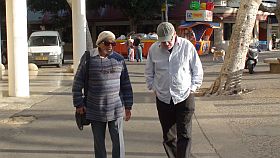
Herz Frank and Tue Steen Müller, Tel Aviv, spring 2011
Another undone matter – it would be obvious to make a dvd-box collection with his films, who could help with that?
Herz Frank understands English, speaks ok German, and is fluent in Hebrew. During our small café meeting he adressed, in Hebrew, Kearn Telias, who works for the CoPro (more about that is posted elsewhere) (Kearn took the photo of Herz Frank and me) and was immediately invited to visit Herz Frank to watch works like ”Ten Minutes Older” and ”235.000.000”, the film from 1967 made by Uldis Brauns and Herz Frank to celebrate the 50 years of USSR. The film was not celebratory enough for the Soviet leaders and was put away. And has therefore not taken the place in the hall of fame for documentaries that it deserves.
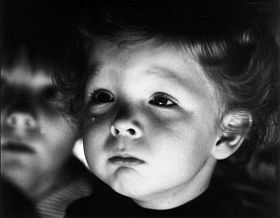
Ten minutes older (1978)
New film project? Yes? What about and how? Herz Frank will send me an exposé and trailer, what I can disclose is the name of the character he wants to make a film about/with. Larissa Trimbobler. Read this text from an article I found online, to give you an idea of the context: Yigal Amir, an ultra-nationalist Jew, shot Rabin to death after a peace rally on November 4, 1995, because he opposed the prime minister’s policy of ceding West Bank land to the Palestinians. He was sentenced to life in prison. Although he is held in isolation, Amir has been permitted conjugal visits over the past year with his wife, Larissa Trimbobler, whom he married while in prison. Their son was born in 2007… (28-03-2011 post by Tue Steen Müller)
www.herz-frank.com
www.copro.co.il
BALTIC SEA FORUM RIGA 2011
Not only young talents pitched in Riga – 85 years old Herz Frank went on stage with his exciting story about Larissa, who has married the murderer of Rabin, and have a child with him.
It was the 15th edition of the Baltic Sea Forum for Documentaries that ended in Riga yesterday with the presentation of a new project by Herz Frank, ”Without Fear”, to be co-directed by the master himself and Maria Kravchenko, with Guntis Trekteris, Ego Media, as the producer. The catalogue annotation goes like this: ”In 2004 Larissa Trembovler, philosophy professor and mother of four, leaves her husband and marries Yigal Amir – the assasin of Yitzhak Rabin. Three years later she gives birth to their son.” The film is in its early production stage and will definitely receive international support when more material is watchable. (14-09-2011 from a post by Tue Steen Müller)
HERZ FRANK IN RIGA 2012
The exhibition space is limited but the content is excellent. The film museum in Riga, situated in the same building as the National Film Centre of Latvia, in the old town of the Latvian capital, hosts a presentation of the life and work of Herz Frank, a filmmaker so often written about on this site.
Frank himself took part in the construction of the exhibition that includes photos and texts and clips from his work, plus the possibility to see in full duration ”Ten Minutes Older” (1978) and ”Flashback” (2002), just two of the master’s documentaries. The exhibition, I was told, is running at least until this autumn. (17-05-2012 blogpost by Tue Steen Müller)
www.kinomuzejs.lv
HERZ FRANK 1926 – 2013
by Tue Steen Müller
Last sunday morning I showed Ten Minutes Older to filmmakers from Lebanon, Egypt, Palestine, Algeria and Morocco. They had not seen Herz Frank’s masterpiece from 1978 before, they loved it and lined up to make a copy so they can show it to colleagues back home.
This sunday morning I learned from friends in Riga that the old master had passed away the night before. 87 years old.
In Beirut last sunday I introduced the film mentioning Juris Podnieks as well, the cameraman of Herz for this film and the man who later became the Perestroika filmmaker, and who got a much shorter life than Herz: 1950-1992. After the screening I came up with the often used banality about the film: You are ten minutes older now, you have just watched the story of our lives. And it is what it is. The director himself has formulated it like this: For ten minutes, uninterruptedly, we were looking into the face of a little boy on the third row… And in the half-dark of the theatre hall we were watching the depths of the human soul as reflected in this tremulous face.
Herz Frank has died. One of the most important documentary directors ever has died.
Personally I had the privilege to meet Herz Frank many times in the last 20 years, and every meeting left me inspired by his charisma, the way he talked about films and his total commitment to what was his profession. Always with a camera at hand, be it to catch a moment in life or in his own film life, like the wonderful group photo on my wall, from Bornholm in 1999 with him in the middle wearing his beret.
Bornholm because of Balticum Film/TV Festival that went on 1990-2000. Herz Frank was there two or three times and slowly you discovered an oeuvre of great importance and significance. Film people in the USSR knew of course how important he was, and you had seen some of his films in Leipzig or in other Eastern European festivals. But our Western European knowledge of documentary films from the East was pretty limited before the fall of the empire.
The festival on Bornholm, not only in connection with Herz Frank, but very much with him as a central character, opened the eyes for a documentary film tradition far from mainstream rationality. And Riga was in the 60’es the place for poetic originality and innovation in documentaries.
The Film Museum in Riga had until October last year a fine, precise exhibiton named “Herz Frank Code”, to which the director himself contributed with photos and texts. The organisers wrote the following on the site of the museum:
Herz Frank is the prophet of documentary cinema – a philosopher, moralist, researcher, having explored the secrets of the joy and the tragic of being, an artist whose works allow the truth to gleam with a thrill of revelation. His films encompass the human life from the sacred moment of birth to the mystery of death and enable to look into the abyss between the good and the evil, the truth and the lie. It is really stunning how fragile the human heart is in front of the look of the camera of Herz Frank.
Before and after 1990, big difference. Herz Frank and others had been employed at the Riga Film Studios during Soviet times, but after Latvia got its independence he had to find his way to funding through production companies. Where all his previous films had been shot on 35mm films, with skilled camera operators, he started to shoot on his own with small video cameras. In 1993 he went to live in Israel, made a couple of films there, gave his films prints to the Jerusalem Cinematheque, had some retrospectives but was never really recognised as he was in his home country Latvia.
Herz Frank’s filmography is full of great titles. Let me mention the 1967 film 235.000.000, a film he wrote, the director was Uldis Brauns, for the 50 year celebration of the 1917 revolution, a beautiful modern “nouvelle vague” cinematic work, totally non-propagandistic, and probably therefore put on the shelf by the authorities before it got its rightful circulation. And the 1989 Once there Were Seven Simeons about the jazz family, which hijacked a plane to escape the USSR.
“Flashback”, however, from 2002, stands out as a superb autobiographical documentary, essaystic, reflective, touching. Herz Frank had with Guntis Trekteris met a producer, who found the necessary funding for the big film to which, let’s be proud of that, also the Danish Film Institute gave a bit of money, when my filmkommentaren colleague Allan Berg was film consultant there. Herz Frank writes about the film:
This is a confession in film. I have dedicated it to all the cameramen whom I had the honor of working with, and whose one eye was dry and the other one – in tears. Every single shot out of 400 shots this film consists of is a true document. Altogether, they form an imaginative weave of a dramatic plot, unique philosophy, personal world perception, and certainly, visual culture. All the rest – words, music, noises, silence, all having their own voice – have grown together with the images dwelling in this film… A person’s inner life, personality, and the eternal problems – love, birth, death, and destiny – are what have always attracted me as a documentary filmmaker… And I have always doubted if we, documentary filmmakers, have the right to expose other people’s life? I was doubtful, still I went on filming.
The original idea behind the film was to go and find the boy from 10 Minutes Older, and Herz did so, but the film took another road as his wife passed away and he himself had a herz operation performed, which by the way is filmed close up! He turned the camera to himself.
In 2012 Herz taught at the Zelig documentary film school, and in March he re-pitched his newest film project that he worked on for years and told me about, when we met in Tel Aviv in March 2011. In September same year he presented the film in Riga, here is the catalogue text: ”In 2004 Larissa Trembovler, philosophy professor and mother of four, leaves her husband and marries Yigal Amir – the assasin of Yitzhak Rabin. Three years later she gives birth to their son.” Lot of footage has been filmed and when I talked to Guntis Trekteris this morning, he said that the film definitely will be finished by co-director Maria Kravchenko and himself.
Link to: kinomuzejs.lv
Link to: latfilma.lv
HERZ FRANK IS ON THE LIST FOR THE 20th CENTURY
by Tue Steen Müller
Many words today to honour Herz Frank. Russian director Vitaly Manski put it like this: “Years will go by, and only 2-3 documentary film-makers will be remembered from each century.” But even today it is clear – Herz Frank is on that list for the 20th century!
Mansky did so on the site of the Russian – yes, long name – Documentary Film and Television Guild (that) is the only professional organization in Russia that unites filmmakers and television workers specializing in documentary and popular science films, documentary TV programs and coverage.
Georgy Molodtsov from the Guild asked filmkommentaren to point at the unfinished documentary of Herz Frank, being co-directed by Maria Kravchenko, entitled “Edge of Fear”. The Guild has put wonderful photos of Herz Frank made during the shooting of this film, take a look, link below. This is what the film is about, from a pitch catalogue: ”In 2004 Larissa Trembovler, philosophy professor and mother of four, leaves her husband and marries Yigal Amir – the assasin of Yitzhak Rabin. Three years later she gives birth to their son.”
… and this is a quote from the site of the Documentary Guild texted by Molodtsov and co-director Maria Kravchenko: «Edge of Fear» is a story told by the author, intertwined with unique archival footage, news reports and real life observations that were filmed over the course of ten years. The film is based on intimate dialogs and observations of the most important aspect of life – the relationship between a man and a woman. The viewer is connected with the characters of the films through the Narrator (Herz Frank himself), who becomes one of the characters in the film. He is present at all of the most important parts of the film shoots, comments on the events and discusses them not only with the viewer but with the director. Together they attempt to find the essence of this illogical and devoid of reason story…
Herz began work on this epic documentary drama over 10 years ago. Three years ago he was joined by Maria Kravchenko, who became co-director on the project. The film is currently at the shooting stage. For many years Herz looked for financial support to finish shooting and complete the film, personally attending international pitchings and forums to gain interest for the project among international producers, even though he was already in poor health. At the moment Latvian Film Center is in the project after Guntis Trekteris has joined the project (he also produced Herz Frank “Flashback”).
Maria Kravchenko, director:
«Herz worked on this film up until the last days of his life. His one phrase, one shot were able to embrace the universe in one swift move. Herz Frank is the universe’s great painter. When you see the material he’s shot – it’s simple, without any particular beauty or gimmicks – but there is so much life in it, such a concentration of feeling and thought, that you end up wondering – how did he do that?! During one of our last meetings Herz said to me – «You know what this film is really about? It’s about Life being unpredictable!». This is what attracted Herz to documentary film – lack of predictability, a desire to touch this enernal mystery of the existence of man, beginning with the creation of the world. He never ceased to wonder at life, like a child who runs out on a sunlit porch and sees his own, new and immense world for the first time. That is how I knew him to be – the Man, the Artist, the Teacher, the Colleague – Herz Frank. May God rest his soul. I will continue working on the film he wanted to make. I promised him that we would finish our film. Definitely. And I hope, that, finally, there would be brave people, who could help us finish this film, which was started by Herz”.
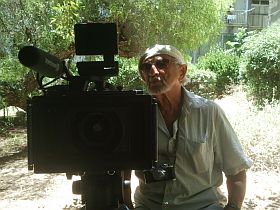
So. film and tv people with access to funding, support/pre-buy/buy this film. Why hesitate? Generosity, please. Photo: Maria Kravchenko, co-director with Herz Frank during the shooting of “Edge of Fear”.
Link to: rgdoc.ru/en/news/
PLAQUE (2014)
I like this tradition so much – the plaques that are put on the walls of the houses, where great artists have been living and working. To honour them and remember. They do so a lot in the Baltic countries and it is only just that a plaque of Herz Frank was unveiled some days ago in Riga at Lacplesa Street 29. In the presence of his two daughters and friends.
Guntis Trekteris, who produced ”Flashback” and is now finishing ”Edge of Fear” together with Frank’s co-director, sent me the photo. If you can not read the text, which is in Latvian and English, it goes like this:
”Prominent Latvian documentary film maker HERZ FRANK 1926-2013 lived and worked here from 1960 to 1993”. (30-06-2014 blogpost by Tue Steen Müller)
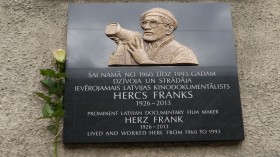
HE IS ON THAT LIST
I am in Riga – again – to take part in a “Baltic Sea Region Documentary Film Research Seminar” arranged by LAC Riga Film Museum. It starts today and my job is to give a brief introduction to the Danish documentary fllm history. More about that in the coming days.
Last night I met with producer Guntis Trekteris to catch up on the theme: When is the premiere of ”Beyond The Fear”, the last film of Herz Frank, made in collaboration with Maria Kravchenko, who finished the work after the death of Frank.
Trekteris told me that idfa had rejected the film so the premiere will be in Riga as the opening film of the new Riga International Film Festival on the 2nd of December. The festival runs until the 12th of December and includes the European Film Academy Awards Ceremony. Also the film will be the opening film of the ArtDocFest in Moscow (December 9), run by renowned director Vitaly Mansky. It was Mansky, who said the following about Herz Frank: “Years will go by, and only 2-3 documentary film-makers will be remembered from each century.” But even today it is clear – Herz Frank is on that list for the 20th century!”
… and the photo is me in front of the beautiful plaque of Herz Frank in Lacplesa Street 29, Riga. Photo taken by Lelda Ozola early September when we still had “indian summer”! (TSM, posted 17-10-2014)
TABITHA JACKSON
Sundance Documentary Film Program director Tabitha Jackson talked at the DOC NYC, the documentary film festival that runs in new York right now, until the 20th of November. Jackson who used to work at Channel 4 in London, and was one of those commissioning editors that I always loved to have at a panel in EDN workshops, because she was able to formulate constructive criticism and not just say ”yes” or ”no”, presented the profile and policy of the Sundance Documentary Film Program saying that “The lingua franca of non-fiction filmmaking should be the language of cinema and not the language of grant applications.”
There is a fine report on Jackson’s keynote speech at the festival in the “Filmmaker” – what I loved to read – a quote – was this:
… she found a rallying cry for sensitive and artistically compelling documentary practice in the work and words of Latvian filmmaker Herz Frank, whose ”10 Minutes Older”, an excerpt of which she screened, contained for Jackson “every emotion you might experience in an entire lifetime” in the single shot of a child watching a puppet show.
She quoted from Frank’s writings: “The first rule of the documentary filmmaker is, have the patience to observe life. If you are observant, if you look not only with your eyes but also with your heart, then life for sure will present you with some particular discovery. And then the reality recorded by you will gain an artistic point of view, become inline with art and always excite people. The facts and events will become old — they become history — but the feelings we felt regarding those events stay with us. Therefore, art is the only living bridge between people of various generations and time periods.” (TSM posted 18-11-2014)
http://filmmakermagazine.com
BEYOND THE FEAR (2015), A REVIEW
By Tue Steen Müller
This article is brought now because the film has its international premiere at HotDocs in Toronto , tomorrow, April 25.
A long prologue: On this site Herz Frank (1926 – 2013) has an iconic status. Co-editor Allan Berg and I met the director at the Balticum Film & TV Festival on Bornholm in the 1990’es, later on in Riga, where we contributed verbally and (a bit) financially (Allan as consultant for The Danish Film Institute) to “Flashback”. Personally I have had the pleasure to have met Herz (Frank) in Tel Aviv on a couple of occasions. He has been a huge inspiration for me in my understanding of what documentaries are and can be.
Allow me to quote Herz: In front of me on my work table is the central fragment from Raphael’s fresco “The School of Athens”. Plato and Aristotle discuss the philosophical meaning of life. Plato is pointing upwards – the essence is the Idea! Aristotle, on the other hand, has his palm pointing down to the ground – the basis is the material! Even earlier in the Old Testament (Genesis) both views are united. In the first book of Moses the first lines states: In the beginning God created heaven and earth. Read – the spiritual and the material.
As a documentarian, I follow these principles directly. Facts have to be the basis for documentary films. And if we want to uncover the truth in them, facts have to be portrayed not only on the surface and as purely informative, but also through sensitive, spiritual eyes. Even better if one eye is dry, and the other – damp… Life has to be filmed imaginatively, and only then will we understand its deeper meaning. There is an image hiding in every detail of each fact, in each living and inanimate thing. You only have to know how to see and record them. A documentary camera is not a video-recorder in the street…
The deeper meaning… is what Herz Frank was seeking in his entire oeuvre. With a constant doubt in his search. Like for this film project that became his last film, made together with Maria Kravchenko, who finished their work in a brilliant way as co-director and editor. Half way through the film Herz Frank formulates the following linked to the film, the two are makingand to the work of a documentarian:
Was it necessary to intrude with the camera into the complexity of life? Will our inclinations result in something heartbreaking, moving and artistic? But it is beyond me to give it up! Do you get me? To give it up mean to say that I am not alive anymore…
A short prologue IN the film: You hear the voice of Maria Kravchenko to an image of Herz Frank telling us the audience that Herz started shooting this film about ten years ago; and that she joined him later to finish the film after his death. Cut to three persons on their way to a prison, a grown up Larisa and two children. Cut to archive material of November 1995, Rabin was shot. Cut to the murderer, Yigal Amir. Cut to a phone conversation between a small boy Yinon and his father Yigal. This opening of a film should be obligatory to watch for all documentary professionals.
These five minutes before the title “Beyond the Fear” appears on the screen, presents the story lines that are followed. Here is the synopsis, cited from a press release I received from the producer Guntis Trekteris, EgoMedia Riga :
Decisions made by the protagonists of the film change their life irreversibly. Yigal Amir at the age of 26 assassins the Israeli Prime Minister. He is sentenced to life imprisonment and becomes the most hated criminal of the state. Larisa, an émigré from Russia, a mother of four, divorces her husband to marry the assassin and give birth to his son. In the course of many years the authors of the film are trying to understand this complicated story until one of them – Herz Frank – does not live to see his film finished, remaining on the threshold of the eternal secret of life, death and love…
It’s a precise text that avoids any tabloid approach or sensational sales talk but conveys that the ambition of this dramatic, psychological film essay is to get closer “to understand”. Contrary to how the media in Israel covered the story (a crazy woman, a fanatic murderer, the fall of a nation, a marriage, a child is born…) this is presented as the eternal fight between Good and Evil, the subtitle of Herz Frank’s film from 1978, “Ten Minutes Older”.
Which is about children watching a puppet show with all their innocence readable in their faces. “Beyond the Fear” cleverly also takes us down that alley. Slowly the focus is put on the small child of Larisa and Yagil. What will his future be, the son of a murderer, who sits for life. The mother Larisa expresses her worry about having drawn her children into moments, where they are cursed in daily situations and knows that Yinon one day will experience that his father is in prison because… where she in the beginning told him that his father was away for work. Yinon learns why. The dramaturgical stroke of genius, actually what binds the film, the red thread in a way, that gives the emotional impact that Herz Frank wanted, is the phone calls between Yinon and his father- They have to be short, according to prison rules, but Yagil tells Yinon stories from the Bible – about Good and Evil and what God can do and has done. And Yinon asks questions as children do it. As the film grows he is taking more and more space. “Heartbreaking and moving” to think about his future.
That was two of the Herz words, the third is “artistic”. Yes, this film has a high artistic quality, even if (as Allan Berg noted the first time we saw it together) you lack the voice off commentary of Herz Frank, this quiet voice of reflection on “la condition humaine”. I could also have done without the predictable vox-pop reporting from the streets, where most people condemn Yagil and Larisa in short rude bites of aggression. On the other side Kravchenko has fully succeeded to give the film space for beautiful wordless sequences and a montage that is superb. I want to re-use the phrase “stroke of genius” to describe how the visual information of the death of Herz is connected to Yinon’s trying to understand what death is.
Do we get to a deeper understanding of the relationship between Larisa and Yagil? No, we get to know them, to have sympathy for them and their constant being in the media, but first of all we get to know that Life is a mystery, never to be solved but to be lived and experienced and interpreted by great artists.
A short epilogue: The film had its national premieres in Riga in December 2014 at the new Riga International Film Festival and in Moscow at the prestigious Russian documentary film festival, “Artdocfest”, famous for its free spirit and open turning against the official state policy.
According to the producer Guntis Trekteris “it is a huge success in Russia, where we got two main professional awards – Laureal Breach (the National Prize for documentary and TV films, ed.) and Russian Film Critics guild prize for the best documentary.” And now Canada and consequently many other festivals, I guess.
Herz Frank & Maria Kravchenko: ”Beyond the Fear”, Latvia, Russia, Israel, 2014, 80 mins. (Posted 24-04-2015)
TARKOVSKY AWARD 2015
To receive an award at a festival that carries the name of Andrey Tarkovsky… Ego Media’s Guntis Trekteris proudly announces that: “ ’Beyond The Fear’ by Herz Frank and Maria Kravchenko (photo of the two) got Documentary Grand Prix in Andrey Tarkovsky International Film Festival “Zerkalo” (Mirror). Congratulations to director Maria Kravchenko, our co-producer Vitaly Mansky and the team!”
And to Trekteris himself, indeed, I can add. The synopsis of the film: Decisions made by the protagonists of the film change their life irreversibly. Yigal Amir at the age of 26 assassins the Israeli Prime Minister. He is sentenced to life imprisonment and becomes the most hated criminal of the state. Larisa, an émigré from Russia, a mother of four, divorces her husband to marry the assassin and give birth to his son. In the course of many years the authors of the film are trying to understand this complicated story until one of them – Herz Frank – does not live to see his film finished, remaining on the threshold of the eternal secret of life, death and love… (TSM, posted 15-06-2015)
”BEYOND THE FEAR” IN JERUSALEM
By Tue Steen Müller
1
Years ago, when in Israel as a tutor for the documentary CoPro event organised by Orna Yarmut, I visited the Jerusalem Cinematheque. I was there with Herz Frank, whose favourite cinema of his home town it was. Herz was proud that 35mm prints of his films were in the prestigious collection. We met the charismatic founder and leader of the Cinematheque Lia van Leer, who died 90 years old this year, always praised as a true supporter of the art of film. She talked warmly about Herz Frank and his films.
Her name has come up in connection with the controversy around the film of Herz Frank and Maria Kravchenko, ”Beyond the Fear”, that has been selected for the upcoming Jerusalem Film Festival, July 9-19. According to i24News (link below) the Israeli Minister of Culture Miri Regev has threatened to withdraw funding for the festival if the film is screened at the festival, making film critic Gidi Orsher write on his FB page: “Had Lia van Leer still been with us, she’d tell Regev where to go…” and many have suggested that filmmakers with films at the festival withdraw their films.
The festival has taken the film out of the festival programme to make it be screened the day before, July 8, according to the website of the festival it is still in the documentary competition! So it seems that it will be screened even if the Minister “calls on the public to stay away from watching the film even when it’s screened outside of the festival…” And, yes, Shimon Peres, has called upon a stop of the screening! Both Peres and Minister Regev have not seen the film, you understand by their comments that the film should be glorifying Yigal Amir, the man who killed Rabin. In all existing reviews of the film seen at international festival and on this site it is stressed that the film is a complex interpretation of a love relationship between mother (Larisa, photo), father and son.
The controversy about the film has been covered internationally by several media, see links below, like Variety: “…In response to her remarks, several hundred artists and filmmakers held an emergency meeting to discuss the threat of censorship and signed a petition that declared, “We hope with all our hearts that Israel will not deteriorate into a country where artists who express their views are blacklisted.”
Much more explicit in tone are opinions by columnists in the newspaper Haaretz like Carolina Landsmann, who has this headline for her article: “Censoring of documentary on Rabin’s murderer shows entire nation lost its marbles”, not to mention an article by Gideon Levy (Headline: Fascism is Bubbling in Israel, and that’s good News… The right-wing is attacking because it is afraid, and it is afraid because it is unsure if it’s right…)
Here is a small quote from his interesting analysis: “How is it that an obscure play put on by an obscure theater in an obscure language, which few people have seen or will see, has raised a storm that refuses to abate? Or that one word in the speech of an aging theater director became a national scandal? Or a documentary that nobody has seen, set to be screened at a film festival, also became a scandal? How is it that artists – most of whom have no impact whatsoever – were the target of such frenzied attacks? Behind all this is the feeling of inferiority complexes and, mainly, insecurities about the rightness of their path. The purpose of turning each and every incident into a scandal is to divert attention from the real problems and incite the masses. Under the surface, however, are explanations from the realm of psychology.”
Also writer Amos Oz has contributed – headline “Why are Israelis so afraid of a culture War – stating that the film that many have opinions about without having seen it could be one that is trying to go deep behind the sensations, maybe with “an Shakespearean approach”? Herz Frank would have loved that!
Sooo… in a country where a government seems to favour cultural censorship, it still stands as a fact that “Beyond the Fear” will be shown July 8 in a cinema in Jerusalem and still in the competition of the Jerusalem Film Festival. And according to the Latvian producer Guntis Trekteris, who has fed me with links, thank you, with the face of the boy blurred. A right decision. (Post 28-06-2015)
http://jff.org.il/?pg=screenings&CategoryID=226
http://www.i24news.tv/en/news/culture/75181-150617-film-on-rabin-s-assassin-partly-pulled-from-festival
http://www.ynetnews.com/articles/0,7340,L-4669125,00.html
http://m.screendaily.com/5089554.article
http://www.bbc.com/news/blogs-news-from-elsewhere-33148290
http://variety.com/2015/biz/news/israel-culture-minister-threatens-cutting-funding-1201520573/
http://www.haaretz.com/opinion/.premium-1.661980
http://www.haaretz.com/opinion/.premium-1.662998
http://www.haaretz.com/opinion/.premium-1.662210
A comment to the post: Peå Holmquist wrote 29-06-2015 09:42:40: ”There is a war in Israel in the cultural sector – The new minister of culture is very conservative and has threatened to close down several theatres Where Jews and Palestinians Are Working together.”
2
Still waiting for Israeli film critics having watched and evaluated the film by Herz Frank and Maria Kravchenko – that is to be screened in Jerusalem July 8, the day before the Jerusalem Film Festival officially starts but still as part of the documentary competition – here is a clip from a competent review from Hollywood Reporter, read the whole, link below:
“…the filmmakers are less concerned with political context than with Tremblover, an Orthodox Jew and Russian émigré to Israel who fell in love with Amir, fought for years to marry him in prison, and is now mother to his young son. Though muddled and elusive at times, ’Beyond the Fear’ is an absorbing meditation on the emotional and psychological aftershocks of violent political events. With Mideast tensions constantly in the news, further festival play seems guaranteed, possibly leading to niche distribution and small-screen interest…” (Posted 02-07-2015)
http://www.hollywoodreporter.com/review/beyond-fear-jerusalem-review-805964
3
The film by Herz Frank and Maria Kravchenko was shown on the 8th of July, the day before the official opening of the Jerusalem Film Festival, whose leaders felt they had to play according to the rules of the Israeli Minister of Culture, who had told them that the funding for the festival would not happen if the film was shown as part of the festival. The Times of Israel (link below) put it like this: (The film was shown) in the small auditorium of Jerusalem’s Mishkenot Sha’ananim center. The screenings were held at the nearby arts center to avoid unnecessary publicity and to abide by the agreement with Regev to keep the film separate from the partially state-funded Cinematheque. There were no protesters in sight… Both screenings were sold out.
I have been in contact with Guntis Trekteris, main producer of the film, who was there with Maria Kravchenko and Israeli co-producer Sagy Tsirkin (photo Trekteris to the left). Trekteris reported that he publicly thanked the Minister of Culture for making this the third time the film opened a festival (the others were in Riga and Moscow) – the film is, even if not shown at the festival venue, the Cinematheque, still part of the official documentary competition!
Trekteris: Yesterday was an alternative (outdoor) screening in the Jerusalem Park opposite to the Old city Park organized by Israeli filmmakers during the official opening of the festival. Very special atmosphere. Many said to us that its a very important film for Israel… Chapeau for the Israeli filmmakers, who made this act of solidarity! (Posted 11-07-2015)
http://www.timesofisrael.com/an-assassins-tale-through-the-eyes-of-the-family-he-started-in-prison/
4
Finally an Israeli competent, reflective review of the film by Herz Frank and Maria Kravchenko, written by Nirit Anderman in ”Haaretz” yesterday July 12th. The introduction goes like this:
“If you hoped to find out why a married mother of four fell in love with Prime Minister Yitzhak Rabin’s assassin, the film ‘Beyond the Fear’ will not leave you any wiser. But the controversial documentary about Amir, his wife and son, has other lessons…”
The extensive review (read it all) has this paragraph that for me is spot on: “The important thing that this film does manage to do, however, and the reason the title the filmmakers chose is successful is this: It reflects and emphasizes the extent to which the public’s attitude toward Amir and Trimbobler is colored by a prism of hatred and fear, and the extent to which this prism has made the discussion shallow. Nearly 20 years after the despicable murder Amir committed, the film helps viewers see how the newspaper headlines relate to him and his wife in demonic terms and how politicians and citizens propose denying them basic rights. This is also what was done in recent weeks by Miri Regev, opposition leader MK Isaac Herzog and former president Shimon Peres, who wanted to shelve the film and thereby preserve the demonic image of Amir and Trimbobler instead of grappling with the fact that they are flesh and blood people who also have softer and gentler sides…” (Posted 13-07-2015)
http://www.haaretz.com/life/movies-television/.premium-1.665571?utm_campaign=Echobox&utm_medium=Social&utm_source=Facebook
5
One more addition to the slate of posts on the premiere of ”Beyond the Fear” by Herz Frank and Maria Kravchenko, again from the Haaretz and again by Nirit Anderman, who wrote a competent review of the film.
This time Anderman launches the story that world famous director Herz Frank was a legend in the documentary community, ”but not in Israel”, where he lived from 1993. Anderman outlines his film carreer in broad terms (should however have mentioned the for many forgotten masterpiece ”235.000.000” that he made with Uldis Brauns) and declares that ”Beyond the Fear” is ”a natural continuation of his former work”, that is described like this “a curiosity to understand the human soul in a non-judgemental way, a readiness to expose himself to an audience and a strict maintenance of the visual language and quality filmmaking were always the cornerstones of Herz Frank’s movies.”
The article of course refers to the debate about the film in Israel and there is a critique expressed, that “the film’s producers kept their movie close to their chests in recent weeks, not showing it to anyone, refusing to let us see it in preparation for this story. The inevitable result was that the endless discussions around it often missed the truth…”
And it has some clever words from influential director Nurit Kedar, who was part of the team that recommended adding the movie to the Jerusalem Film Festival’s competition. “Frank accompanied her (Larissa, who married Amir, ed.) for a long period, perhaps six or seven years, trying to establish why she fell in love with him, how it happened. I didn’t feel any sympathy towards Amir while watching the film. All his images are known from media stories, and the only new thing is his voice during the conversations with his son.” (Posted 22-07-2015)
http://www.haaretz.com/life/movies-television/.premium-1.666722?utm_campaign=Echobox&utm_medium=Social&utm_source=Facebook
ULDIS BRAUNS
By Tue Steen Müller
During the many years that I have followed Latvian documentary cinema, the name Uldis Brauns has always been like a magic enigma. Who is he, where is he, what is he doing? The master, that is how he is characterised by many, including his late close colleague Herz Frank. The man who directed ”235.000.000” (1967), a work that far too few know about, that story comes later. I did not see him at the Riga symposia organised by another big name Ivars Seleckis et co. and when I asked around, I was told that he lives in the countryside and is not involved any longer. A loner, he was said to be.
Finally I had my curiosity saturated. Sunday after the Baltic Sea Docs Uldis Cekulis, Arvids Celmalis, Kristine Briede and I drove to his place ”Upeskalni” near the nice town Kuldiga (often pronounced Cool Diga!) in the Kurzeme district of Latvia. 90 minutes from Riga you turn down a dirt road and drive twenty minutes to reach a house standing alone (2,5 kilometer to nearest neighbour) in what you can only describe as a paradisiacal garden with tall trees, chickens and geese walking and running around, a greenhouse for tomatoes, rows of vegetables and a river down at the bottom of all the green. Silence! Not to forget an old chevrolet and a tractor, and a cottage where Uldis Brauns took us for a traditional Latvian welcome – homemade beer.
From the first moment Uldis Brauns proved to be a storyteller, first when passing trees that had been planted in memory of his and his wife Dainuvite’s parents. We communicated with translation help of Kristine Briede, who has been visiting Brauns many times and has his confidence. We talked about ”235.000.000”, and I got the story about the film (working title USSR 1966) that was first rejected on a project basis, when Brauns and his colleagues turned up in Moscow with a very precise budget, but on the way out from the meeting, they were called back and had an ”ok, go ahead”. Which they did to make the film that was shown in Leipzig. With consequences. Brauns was called to Moscow and was told that he should cut from the moment where the GDR high representatives left the cinema (!), no further explanation, plus some other moments including a scene from the official welcoming of de Gaulle to Moscow. Brauns was not in Leipzig, he did not know that the film would be shown there! The film exists in three versions, 70 minutes, 110 minutes and 140 minutes. The latter, the director’s cut, lies on the floor in the Riga flat of the director and needs to be restored – on the way back our small group decided to address the National Film Centre of Latvia to ask for help to have this happen.
Brauns and his wife hosted us wonderfully, we saw a painting he had made, ”Boy with Red Balloon”, a fine work, that made us talk about Albert Lamorisse’s film from 1956 and he had great anecdotes about his meeting with Jacques Demy and Agnès Varda on an international festival.
(Before the visit I had seen a dvd ”Comeback” issued by Society European Documentary Symposium with 5 of Brauns many short films, including the beautiful ”White Bell” that he shot, Herz Frank script wrote and Ivars Kraulitis directed. One of the films, directed and shot by Brauns, is ”Summer” that is made in Kuldiga. We did not have time to talk about them).
Photo: The last couple of hours of the visit took place in the sleeping room in the house. From left you see Uldis Brauns’ wife Dainuvite, Kristine Briede, Müller with number 10, that´s me, Uldis Brauns and Arvids Celmalis doing sound and the dog Voucher being carressed.
We were looking at sequences of ”235.000.000” – with big difficulties because of dvd machine treating the dvd in a strange way – sabotage, Brauns said – but we had no problem in seeing how magnificent the film is. And how actual it is: many scenes deal with ”departure” and ”love” and ”waiting” for the soldier to come home. The camera work is the whole way through amazing, Brauns told us how he had prepared the camera people in beforehand in a film that have now words and when you see it today, is an homage to Life and to the joyful co-existence of people from the many republics of USSR. The reason for putting aside the film can only be found in the advanced poetic storytelling and the focus on ordinary people and their lives in grief and happiness.
Uldis Brauns, a man of 81, walking with a stick, slow but fresh in mind and generous and mild. He has been living in the house in the countryside since 1971, nature surroundings shape people… (TSM, post 09-09-2014)




